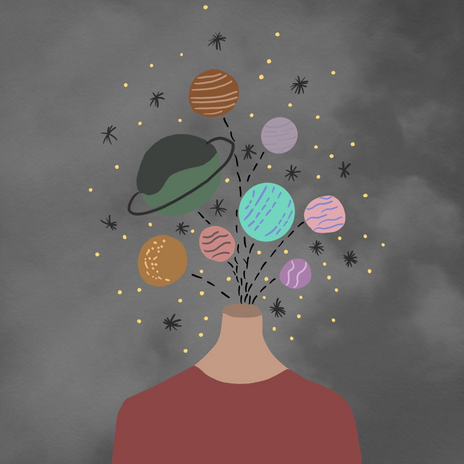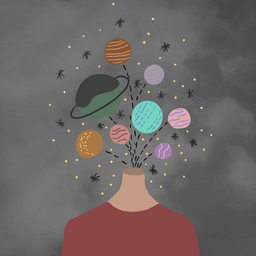Edited by: Janani Mahadevan
This article is part 4 of a series on Mental Healthy and Therapy. Be sure to check out part 1, part 2 and part 3 here!
Have you ever found yourself trapped in a never-ending cycle of your thoughts affecting your behavior, which ultimately affects your thoughts again? If so, let me paint a picture here: maybe you also believe that if you could just change the way you think about something, the way you behave could also change. Maybe you’re not so concerned about the past as much as you are about the present. Maybe you like having a relatively structured life and setting concrete goals. These ideas may seem unrelated at first glance, but they all align with the world-view of a cognitive-behavioral therapist. If the picture I’ve painted seems fairly similar to your beliefs or the way you perceive yourself, and you’ve been considering therapy, it might be helpful to seek a cognitive-behavioral therapist.
A therapist aligning with the cognitive-behavioral approach is most concerned about your thoughts, or cognitions. They believe that any psychological distress that a person feels is often fostered by their cognitions. They’ve even created a model to explain how this plays out called the ABC model. Let me illustrate using an example (TW: social anxiety): Suppose you’re in class. You’ve answered a question from your professor incorrectly, and your peers start laughing at you. You may think that you’re not as smart as your peers and that you deserve to be laughed at. You feel embarrassed and you resolve to never speak up in class again. Under the ABC model, you answering the question incorrectly is the activating event (A), the first step of the model. Your thoughts about not being smart enough are your beliefs connected to what happened (B). Finally, your feeling of embarrassment and the resolve you made is the emotional and behavioral consequence (C).
Generally, people are unaware of their beliefs, be it rational or irrational, about an activating event, so it’s easy to assume that the activating event is the reason why the person feels the consequence. However, a therapist following a cognitive-behavioral approach would vehemently deny this assumption. Instead, they’d tell you that it is actually the belief about the activating event that leads to the emotional and/or behavioral consequence, be it healthy or unhealthy, and not the event itself. Basically, when an event happens and you feel something, it’s not the event itself that makes you feel it. Instead, it is your underlying beliefs about the event. And, well, since you’re not really keeping tabs on what those beliefs are, it’s part of the therapist’s job description to help you figure them out.
Cognitive-behavioral therapists are also more likely to be focused on the present than the past. They’re more concerned with what is happening with the client in their present circumstances. However, this is not to say that they’re not interested in understanding how clients came to have the beliefs that they do, but their priority is the present. This is because understanding people’s present beliefs play a huge role in understanding how these therapists can help them in therapy.
A therapist with a cognitive-behavioral worldview takes on a very active role in therapy. Among all of the theoretical orientations of psychotherapy, the cognitive-behavioral approach can seem a lot like sitting in a room with a therapist who feels like an educator. Many such therapists often walk their clients through what therapy can look like and what they can expect, what leads to certain maladaptive behaviors, thoughts, feelings, and so on. This is quite unlike the psychodynamic orientation, in which the therapist takes on a more neutral stance, or the humanistic orientation where the therapist can feel more like a passive listener. A therapist following the cognitive-behavioral orientation is often vocal about what they want their clients to do; one could describe them as active guides, gently leading you towards wherever you want to be at the end of therapy.
Cognitive-behavioral therapy can feel very goal-oriented. Aside from educating the client on maladaptive thoughts, they help clients learn skills that can help them cope in order to help you better set concrete goals and meet them. Moreover, they expect you, as a client, to put in individual work towards meeting these goals. Don’t worry if you find yourself unable to do so! Your therapist may seem like an educator at times but they won’t think badly of you. If they find that you’re unable to work towards your goals, they will help you explore what might be blocking you from doing your part of the job.
How exactly can a cognitive-behavioral therapist help you? Add a ‘D’ and an ‘E’ to the ABC model, and you’re one step closer to the answer. Once the therapist has helped you figure out some of the irrational beliefs that you hold about an event, they move onto helping you change your cognitions to help you feel and behave differently. Let’s follow up on my previous example. The therapist has helped you identify your beliefs that you’re not as smart as your peers and that you deserve to be laughed at. The therapist then helps you dispute your beliefs (D). This process of disputing involves 3 elements: discriminating, detecting, and debating beliefs.
The first element, discriminating, involves having to discriminate between your rational beliefs and irrational beliefs. One way to look out for those is to consider whether they’re self-helping (rational) or self-defeating (irrational) beliefs. Next, detecting is basically identifying your irrational beliefs. These beliefs usually include absolutist terms like “shoulds” and “musts”. For example, “I should be friendly to everyone,” or “I must work for more than 10 hours a day.”
Once you’ve detected your irrational beliefs, the therapist encourages you to debate them. Do they make sense? Are they logical? Do you have any rational examples backing them up? It’s basically like arguing yourself out of your beliefs. So, if you like debates, here’s your clincher. Once you’ve shaken your entire irrational belief system and are left hollow (just kidding!), your therapist helps you develop an effective and rational belief system (E), which consists of replacing your irrational beliefs with rational ones.
It’s important to realize that it’s impossible to completely stop irrational beliefs from arising. That’s not very practical. What cognitive-behavioral therapists can help you do is make an effort to reduce the frequency of such beliefs. The idea is not to eliminate but to minimize. Therapists can then encourage you to develop a rational belief system so that you are also shielded from irrational beliefs should they crop up.
So far, if you’ve noticed that the client seems to have an awful lot to do during therapy and not just the therapist, you’re right. If you go to a cognitive-behavioral therapist, you can expect yourself to play an active role in therapy as well as outside of it. Most cognitive-behavioral therapists are huge on homework. This can seem strenuous, especially to those of us with packed schedules and an ever-increasing load of assignments, but they can be really helpful and effective if you do follow through.
Cognitive-behavioral therapy can seem more rigid and goal-oriented than other forms of therapy. If you prefer a setting such as that, I urge you to go for it. Moreover, cognitive-behavioral therapy occurs over a short period of time, usually between 5 to 20 sessions, which is advantageous in terms of saving your time and money. So, if any of the above concepts sounded appealing to you and you’d like to go for therapy, I’d suggest you try going to a cognitive-behavioral therapist. You won’t only learn more about the way you think, but also about what you are capable of changing about yourself!



